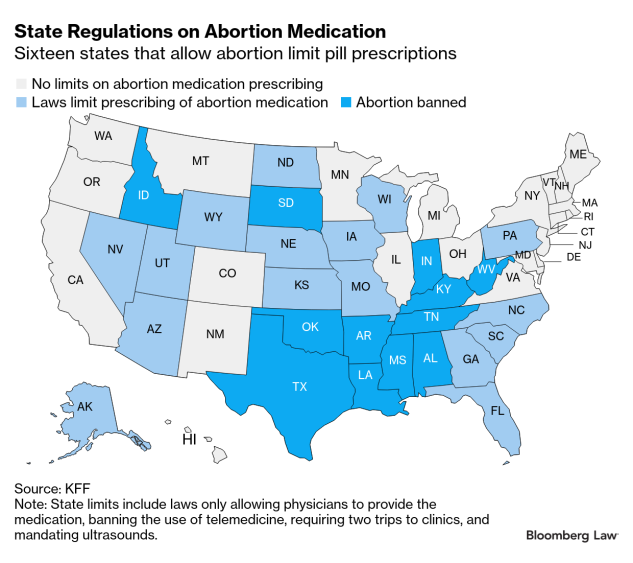- Anti-abortion groups target wastewater, drug distribution
- Access proponents commit to protecting telehealth prescribing
Anti-abortion groups are executing a multi-pronged state lobbying campaign to limit access to abortion medication as question marks surround ongoing federal litigation and the Trump administration’s approach to the issue.
Students for Life Action is sending staff and college students to 26 states from January through March to advocate for model legislation they say “prioritize the preborn.” One of the bills would require patients prescribed medication abortion to collect any fetal remains with medical waste bags, while another would allow penalties for the mailing of pills.
Organizations supporting reproductive health access are responding by meeting with lawmakers to defend the safety and efficacy of abortion medication. They’re also examining legislation to protect access to telehealth prescribing and limit barriers to minors seeking abortion care.
After anti-abortion physician groups were unsuccessful in securing a court order to remove the abortion pill mifepristone from the market, state legislatures are poised to be central in shaping access to the medication that now accounts for nearly two out of every three abortions in the US.
Anti-abortion groups “know that with mifepristone available on the market, people are still having abortions, and that is not what they want to see happening,” said Kirsten Moore, director of the Expanding Medication Abortion Access, or EMAA, project.
Medical Waste Battle
A total of 12 states completely ban abortion with limited exceptions, with 16 additional states limiting the prescribing or distribution of abortion-inducing medication, according to KFF. These restrictions include that only licensed physicians may prescribe the medication after in-person counseling.
President
Some anti-abortion advocates are targeting environmental laws and the contamination they claim the abortion pills are bringing to waterways. SFL Action’s lobbying includes visits to 11 states to advocate for model legislation that would require health-care providers to give patients receiving abortion medication “a catch kit and medical waste bag, including instructions for the patient to bring the catch kit and medical waste bag to the health care provider for proper disposal.”
The group’s goal is to prevent “chemically tainted blood, placenta tissue, and human remains from Chemical Abortions currently flushed directly into America’s wastewater,” according to the organization’s policy agenda.
It’s “a public health issue,” Kristi Hamrick, SFL Action’s vice president of media and policy, said in an interview.
The proposal came up at a December meeting of the National Association of Christian Lawmakers—a group that has relied on the Justice Foundation’s Operation Outcry to connect with women available to testify in state legislatures about abortions they regret.
Mary Browning, Operation Outcry’s legal adviser, said she knows of women who “would readily be available and be willing to testify” in support of the medical waste collection bill.
But Susanne Brander, an ecotoxicologist at Oregon State University, said there’s no evidence to suggest that mifepristone or misoprostol presents a “heightened risk” compared with other pharmaceuticals.
“When you are aborting fetal material and the uterine lining at such an early stage of pregnancy, that’s not dissimilar to having your period,” Brander said in an interview.
Pill ‘Trafficking’
Anti-abortion groups are also advancing bills to prevent the distribution of the medication, framing the proposals as a way to protect individuals from taking abortion-inducing pills without their knowledge or consent.
Legislation recently filed in Texas (HB 1339) was modeled off a first-of-its-kind law enacted in Louisiana this year classifying abortion medication as dangerous controlled substances.
Abortion access proponents say many of the bills introduced thus far would make the drugs and other reproductive health care virtually unavailable.
A bill introduced this month in Indiana (SB 241), where abortion is already banned with limited exceptions, would allow the state attorney general to investigate any individual believed to be involved with “trafficking an abortion inducing drug.”
In Missouri, where Republican lawmakers are trying to undercut an abortion rights constitutional amendment that voters approved in November, proposed legislation (SB 119) seeks to make the “possession” or “delivery of an abortifacient drug” a felony punishable by up to 10 years in prison and a fine of up to $10,000.
Moore said the passage of these bills in states that already prohibit or restrict abortion means “every single prescription for misoprostol, a drug that’s used commonly for all kinds of indications like getting an IUD inserted to prepping the cervix for labor and delivery,” are “all going to be subject to a heightened level of scrutiny.”
Expanding Protections
A major component of abortion access groups’ response to this legislation is “putting out a narrative that mifepristone and misoprostol are safe and effective,” said Jennifer Driver, senior director of reproductive rights at State Innovation Exchange.
State lawmakers are also looking at expanding protections for prescribers. A bill introduced in New York (S36) would allow prescription labels for mifepristone and misoprostol to include the name of the prescribing health-care practice instead of the prescriber’s name. New York Gov. Kathy Hochul (D) included similar language in her fiscal 2026 budget proposal Tuesday, saying “medical providers in New York who prescribe medication abortion to patients in antiabortion states face risks if their identities are disclosed.”
In Connecticut, two bills would allow the state to import the active ingredients of mifepristone, misoprostol, and Plan B (SB 435), and allow pharmacies to compound active ingredients to produce these medications (SB 434).
Preserving access to the medication is pivotal, especially for individuals living in states with abortion bans, said Brittany Fonteno, president and CEO of the National Abortion Federation.
“Medication abortion has really been a lifeline for many people who still need and deserve care,” Fonteno said.
To contact the reporter on this story:
To contact the editors responsible for this story:


